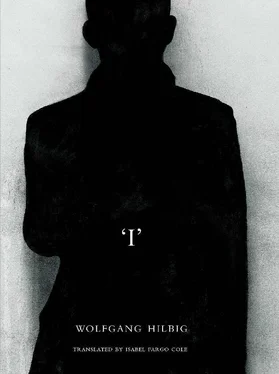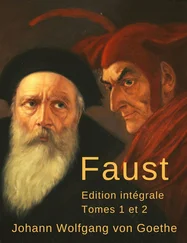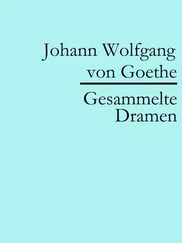A child has got to have a father! they’d said to him. This notion was not news to him, but of course they’d meant that this child. . a very particular child. . needed a father because none was available. Now this was a view he didn’t share at all, he himself had been a fatherless child all his life, and clearly it had done him a world of good. — But he listened to the story. . it had begun with these words, and from then on he was embroiled in those conversations which he often called his conversations with reality. Starting with these words — it wasn’t Feuerbach who had said them, nor any other person he ever set eyes on again — the conversations took their course. . by the time the problem those words raised had evaporated from the conversations, it already seemed impossible to escape. What was the sticking point that even in his long sleep phase had kept him from believing in escape? Even before truly grasping the fact that retreat was no longer possible, he’d stupidly suppressed all thoughts of his ensnarement: doubtless this had been their intention. They had left him alone until he simply ceased to ask himself whether, and how, he’d still be capable of leaving. . he didn’t have to leave, since they were really just conversations, and no one even minded that he conversed like a somnambulist. — And then suddenly they’d brought the term reality massively into play. . this hadn’t come from Feuerbach either; this too was a person he couldn’t recall, he only heard a rather penetrating bass voice, he no longer knew whether this person had been in uniform, and he didn’t know whether it had been in Berlin or back in A.
Nor could he recollect the exact words that had been said; their basic thrust was extremely simplistic, they were taken from the endless stock of generalities specially designed to relegate the mere attempt at a counterargument to the realm of evil, or at least belligerency. — Herr W., said the man behind the desk, someone has to tell you this loud and clear! At some point you have to stop living life as one big retreat from reality. No one can sneak away from his place in society. All of us have a responsibility towards reality, if you try to weasel out of it, it’ll catch up with you one day. . hopefully before it’s too late. Because for you that could be a bitter pill — reality takes no prisoners!
Later W. knew that these words had signalled the end of his sleep phase. When he heard them he immediately felt overtaken by an attack of fatigue so severe that he began to teeter on the chair diagonally opposite the desk. He felt overpowered by the urge to rest. . I can’t take another word, was his only thought, not another word, however meaningless! — In that moment he would have done anything just for a gesture releasing him from his seat and allowing him to walk out of this office. The lids sank over his pupils as though he’d spent days here on this chair already — it had been little more than a quarter of an hour. And the room swam with whirling vapours, darkness from nowhere seemed to veil his interlocutor, his tongue and vocal cords were seized by incomprehensible paralysis, he no longer saw a thing. . perhaps the gentleman behind the desk had stepped outside; shaking his head, he signed the paper on the desk in a barely legible scrawl. In that instant the gentleman was back in the room and began to talk soothingly to W. while quickly stashing away the piece of paper. Now, the man said, now everything was hunky-dory. . It was an expression W. later thought back on with feelings of disgust. . Nothing could go wrong now really, that had been the right step to take! — Later W. wondered for whom nothing could go wrong: the officer behind the desk or him, W., the undersigned. His signature on the paper had been completely illegible. . and later he’d changed his name on his own; he invented a name which, in a pinch, could be discerned in the ballpoint hieroglyph under that declaration.
For some time after that he’d tried to work out the repercussions of this signature. Sitting on his basement seat he sought to recall what had preceded it, sought the reason for reality’s abrupt departure from that room; he’d sat in barely breathable air, amid shadows that had materialized, that were no longer contained by the walls of the room. . Without reality, there isn’t the slightest reason to go on withholding my signature! he’d thought. Right after the signature, reality had returned; he couldn’t have said in what way it was changed. The little gleam of triumph in the sharply appraising eyes of the man across from him — that didn’t count as a change. And he might have been mistaken there; the man behind the desk had assumed the most serene of expressions, his words were reassuring, his gestures dismissive, as though through his own persuasive example to eliminate any hint of ill feeling, of irritation. . W. couldn’t have said whether this had had any effect on him.
Later he suppressed every inkling of the consequences such a signed paper might have, and this, evidently, was just what Feuerbach wanted. — When he’d mentioned his signature once, quite offhandedly, yet looking at the first lieutenant in suspense, Feuerbach said: Forget about it. . in this business there’s so much paper fluttering around that we need entire wastepaper collection points just for ourselves. Didn’t you know we’re the best source of raw material for toilet paper? Yes indeed, we’re an essential factor of the national economy. .
Gradually W. forgot about the signature. . when more and more rarely it did cross his mind, he told himself that maybe he really had signed a paternity declaration. . he was gradually catching on to the type of jokes that were daily fare at his new firm. Yet it was a paternity declaration with no consequences whatsoever: the amount of monthly child support, income-dependent, with which he was to provide for a child he didn’t know — or barely knew, to be precise — was never stipulated. And then of course there was no income to serve as a yardstick, since W. hadn’t had a regular job for years. — He lived as though on the flatline that was his bank balance: when he thought of this line he felt like a dead-tired long-distance swimmer; though he hadn’t made progress in ages, he never sank below its surface — this was one of the peculiarities of his existence to which even Feuerbach referred as a phenomenon . By that he meant the life led by a whole slew of so-called independent writers in Berlin’s unofficial culture industry. They lived in constant danger of having their true status called by name and declared an offence: it was the status of asocial elements, forced to live more honestly than any comfortably installed citizen because the least blunder could bring the whole force of the law down upon them; a blunder far short of shoplifting, an inadvertent overdraught would suffice. Feuerbach admired these balancing acts in his smirking fashion, behind which always lurked the knowledge that in most of these cases he himself could tip the scales. — He doesn’t admire me, though, W. said to himself, grinning too; presumably the stability of my bank balance is tied to the paternity declaration. One of these days I’ll get my driver’s licence and buy a car! Then we’ll see if the line still holds. — With his signature, then, he had acknowledged Someone as his father! Of course he didn’t know whom. . Feuerbach would have denied it categorically. . I’m not your father, I’m an interchangeable go-between, something like an editorial secretary with sleeve protectors, completely dependent on your chronologies, my dear chap! That would have been his take on the matter. — It was beside the point; at any rate W. had a father who made sure that his bank account didn’t go into free fall, however much money he withdrew.
Читать дальше












